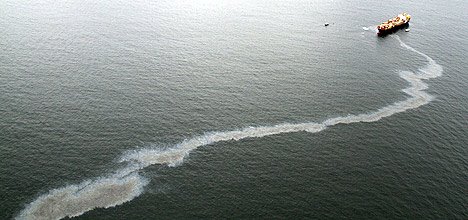Lessons learned from the Rena grounding off Tauranga will be put into practise during a major oil spill exercise around Coromandel harbours next month.
The Waikato Regional Council exercise involving up to 30 staff and including supporting agencies will test the effectiveness of booms in helping keep oil out of environmentally sensitive Coromandel sites.
The oil leaking from the cargo ship Rena, when it first grounded back in October.
The exercise will begin at Whangamata Harbour on June 12 and may also include the Otahu estuary and Opoutere Harbour.
Non-toxic sawdust may be used to simulate oil floating on the water.
Regional on scene commander Adam Munro says the council's annual marine spill exercise, normally a one day exercise at one location, is designed to deal with the effects of a spill inside a harbour.
'This year, following on from the Rena disaster, we're exercising up to three days and up to three locations with a view to helping keep oil from a big spill out of the two harbours and the estuary.”
The council and Maritime New Zealand developed a series of site specific response plans when it was predicted oil from the Rena would impact the Coromandel's east coast.
The narrow entrances to some Coromandel harbour and estuary areas meant there may be a good chance of using booms to help block them off from spills out to sea, says Adam.
'Because of potential impacts to these important and vulnerable environments, every effort should be made to redirect and recover oil before it enters the upper areas of harbours and estuaries, thereby minimizing environmental damage and recovery cost.
'Should a big spill again threaten our region we want to see if our planning, and Maritime NZ's equipment that we use, is up to the task of protecting these environments using blocking booms to keep out as much oil as possible.”
The exercise will take into account the recommendations of a post-Rena Maritime NZ report on the use of booms to protect Whangamata, Otahu and Opoutere.
In the event of a big spill, it may not be possible to protect every threatened site using booms and sites would have to be prioritised accordingly, says Adam.
'This exercise will be a good opportunity to work with supporting agencies and to judge whether our current equipment is adequate for a range of scenarios.
'If we think more or different equipment is needed, we'll make recommendations on this to Maritime NZ.”



0 comments
Leave a Comment
You must be logged in to make a comment.